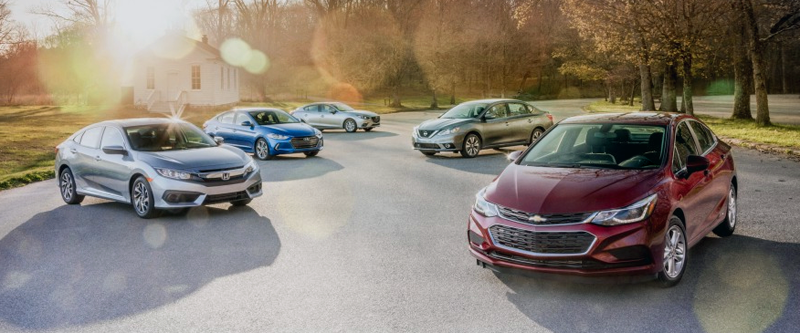Segment shrinks by over 10% as alternative power models hit new heights

Sales in the Compact segment fell by 10.1% to 464,749 in the first quarter of 2018, a faster rate of decline than the 7.0% the segment experienced in Q4’17, and a much faster one than the 3.8% decline in 2017 overall. It is a sign of just how badly the mainstream segment has been hit of late that this decline still makes the Compact segment the second best-performing of all the mainstream segments, with only the Minivan segment doing better. However, there is hope on the horizon in the form of the new Ford Focus and VW Jetta that are about to go on sale, and a new Toyota Corolla be not far behind. With the alternative power subsegment starting to make a meaningful impact on sales thanks to cars such as the Chevrolet Bolt / Volt duo and the plug-in Toyota Prius Prime, it will be interesting to see how well the new Nissan Leaf is received.
Highlights:
- Given the decline in the segment overall the Top 3 did really well, with the segment-leading Honda Civic managing to eek out a small increase in sales, while the third-placed Nissan Sentra continued its remarkable rally as it once again posted double-digit sale growth
- The rest of the Top 10 did less well, with most models losing between 5% and 15% of sales since last year, with the exception of Chevrolet Cruze (down 26%) and the Volkswagen duo Jetta and Golf (down 40% and 47%, respectively), all of which suffered from the arrival of a new compact crossover in the brand that has been much better received than its predecessor (the Chevrolet Equinox and Volkswagen Tiguan L)
- Just outside the Top 10 was a bevvy of alternative-fuel cars, starting with the fourth-generation Toyota Prius (sales down 24%) and continuing with Toyota Prius Prime, Kia Niro and Chevrolet Bolt, all of which posted sales growth rates of over 30%, allowing them to easily outsell their closest rivals Chevrolet Volt (sales down 37%) and Nissan Leaf (sales down 23% as the model changeover is just beginning)
- It is interestingly to consider the success of the Kia Niro alongside the relative failure of the Hyundai Ioniq, which suggests that the crossover alternative power subsegment may not be quite as niche as some may have thought
- Models we lost in 2017 include Buick Verano and a run-out of the Dodge Dart, with Volkswagen Beetle, Mitsubishi Lancer and Fiat 500L all possible candidates for the chop this year
Note: “AP” designates models that are classified in the Alternative Power segment, presented here for comparison; clicking on the model name opens the sales data page for that model; clicking year in the legend turns the display for that year on/off

